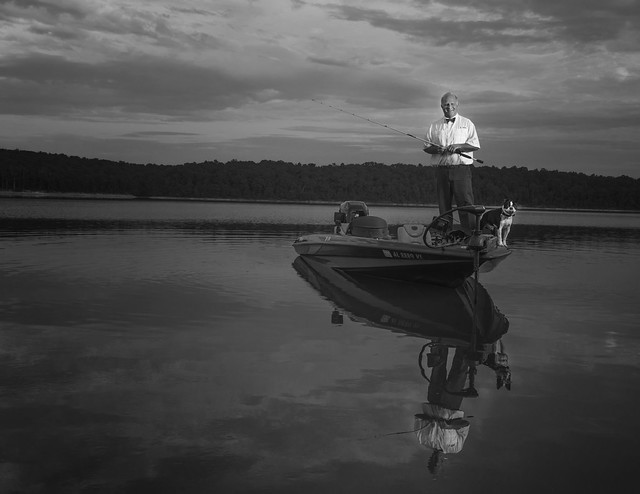Surplus manager Bill Capps is honored to be a Phil and support the Women’s Philanthropy Board
Article body
Bill Capps has always considered himself a regular guy.
The Auburn University surplus manager likes to fish, play with his Boston Terriers and spend time with his wife.
He’s also a philanthropist. It’s something he never thought was possible until he was asked to be a “Phil” by the Women’s Philanthropy Board, the flagship program of the Cary Center for the Advancement of Philanthropy and Nonprofit Studies.
The Phils serve as members of the men’s auxiliary of the WPB. Being a Phil requires an annual donation that helps fund scholarships, grants, mentoring initiatives and other educational programs designed to help individuals achieve independence as financial decision makers and donors. Each Phil is also featured in a colorful calendar with professional, creative photographs that help tell each donor’s story. Capps is pictured on his bass fishing boat.
When asked to be a “Phil,” Capps didn’t feel like it was a burden. He considered it an honor.
“I was flattered,” he said. “It caught me off guard and I thought this was a great place to support the university. I hope to do this for many years to come.”
Capps said he and his wife live a “simple life,” but they have enjoyed the Women’s Philanthropy Board events and all of the people they have met as philanthropists.
“I really enjoy all the new friendships I’ve made and the events we attend. We don’t get out a lot.”
The core of the Cary Center’s mission is helping participants discover their purpose through learning, giving and growing. Philanthropic engagement is a cornerstone of the program. Cary Center programs teach all ages they can leave a legacy through discovering their purpose, no matter how many resources they may have.
“I never did consider myself a philanthropist,” Capps said. “I’m sure there are much larger philanthropists, but this opportunity really opened my eyes to philanthropy. You don’t have to be a millionaire. You can be a regular guy.”
The most satisfying part of it all is knowing his contribution is making a difference in the lives of others at Auburn, the place where he grew up and his spent his entire working career.
“We’ve always been here,” he said. “I’ve probably spent 98 percent of my breathing life living or working here.”
Capps began taking classes at Auburn’s business school in 1979. He graduated in 1988, working with his father’s business and taking classes when he could.
“I saw the [10 year] high school reunion going on, and I said, ‘I’ve got to complete this,’” he said with a warm smile.
And he did. Capps started his career at Auburn working in the chemistry department’s Scientific Supply Store. “That was my introduction to the university,” he said.
Now, he is the Surplus Manager in an auxiliary division of the university.
“I live here, I went to school here. I know the professors and the staff. It’s been a big part of my life.”
To say Auburn is family to Capps is an understatement. He grew up on Samford Avenue when Auburn was a quiet village. His great-grandfather was a veterinary instructor in the 1920s. Both of his grandparents are Auburn graduates. His parents attended Auburn, and his wife is an Auburn graduate. His father-in-law, Les King, took scores of iconic pictures at Auburn as chief photographer on campus for years.
Capps encourages other men to consider becoming a Phil through the Women’s Philanthropy Board.
“It’s easier than you would think,” he said. “We don’t miss the money because we know it’s going to a good cause. My wife and I don’t have kids. We may not have the biggest jobs on campus but we feel fortunate. We always felt we needed to give.”
And what better place to contribute to than the place that has given Capps a good life?
“The university has been good to our families,” he said. “That has been the great thing about giving back.”
Related Media
Media interested in this story can contact Communications Director Preston Sparks at (334) 844-9999 or preston.sparks@auburn.edu.
Auburn University is a nationally ranked land grant institution recognized for its commitment to world-class scholarship, interdisciplinary research with an elite, top-tier Carnegie R1 classification, life-changing outreach with Carnegie’s Community Engagement designation and an undergraduate education experience second to none. Auburn is home to more than 30,000 students, and its faculty and research partners collaborate to develop and deliver meaningful scholarship, science and technology-based advancements that meet pressing regional, national and global needs. Auburn’s commitment to active student engagement, professional success and public/private partnership drives a growing reputation for outreach and extension that delivers broad economic, health and societal impact.





